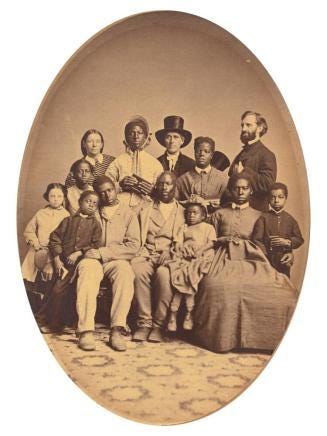Review of Annette Gordon-Reed's "On Juneteenth." (2021)
Annette Gordon-Reed, On Juneteenth (New York: Liveright Publishing Corporation, 2021), pg. 148.

Making history accessible and engaging is a challenge for all historians. How can someone write an accurate narrative of the people of the past, without giving into the lure of fictionalized history, or embellishing details because it makes the story flow better or removing complexities that seem to require pages of information. Annette Gordon-Reed (1958-present), a professor of history and law at Harvard University and Pulitzer Prize winning author, produced an insightful short book, On Juneteenth, about race and Texas that is complicated without being verbose and unwieldy. An incredible writer, Gordon-Reed interconnects six essays on the history of Texas with her own personal history of growing up as an African American in Texas in the 1960s and 1970s. The result is a fast paced, nuanced, and interesting study of Juneteenth and race in Texas.
Each of Gordon-Reed’s chapters features personal vignettes and a connection to aspects of race in Texas’s past. She covers the topics of the myth of Texas history, desegregation, Black Texans origin stories, Native American life, the Alamo, and finally Juneteenth. Punctuated with witty phrases, profound ideas, and a respect by and large for the nuance of the past, Gordon-Reed captures the complicated way in which stories are told. One of the central guiding arguments of her book centers on the idea that “the past is dead. But like other formerly living things, echoes of the past remain, leaving their traces in the people and events of the present and future.” (pg. 33) This idea, that traces of white supremacy, slavery, and myth making linger in the present, is powerful and one which I found quite insightful.1 This idea is helpful in tracing the effects of generations of slaveholding and race-making in the Atlantic World.
One of the great strengths of this book is the nuance laced throughout. When she recalls growing up in a deeply segregated and racialized town in Texas, she notes the complexities of being the only Black girl to choose to enroll in a white school (the others chose an all-Black school). Rather than aggrandizing or demonizing her fellow humans, she traces historical residues that perhaps influenced the racism she experienced as a young child. Furthermore, she notes the complexities of integration, the story of the Yellow Rose of Texas, of Native American slaveholding, and of the heroes and villains we paint into our histories. However, she is also emphatic that we cannot erase the generation buildup of race-relations in America, nor of the oppression that African Americans experienced. However, she is equally emphatic that there is a need to see people of African descent out of the confines of the plantation and explore the complexities of humanity. Each chapter is brimming with insights such as these and pushing for a more complicated narrative of the past.
That being said, at times her nuance fades as she does not fully give people credit for their beliefs. Much of the white supremacy is uncomplicated learned behavior from the past. However, I wonder if she could have placed even more nuance, for example into why people were shocked that Sally Hemmings spoke French. Her reasoning that it was because they were taught that Black Americans were incapable of doing so likely is right in many cases. However, perhaps some of the shock may have come from being taught in colleges that the violence of slavery kept enslaved people from learning at all. This type of assumption is scattered throughout the pages.
In short, this book was well done, complicated, yet fast flowing. Gordon-Reed pushes readers to see not only the complexities of the past, but the complexities of people today. I do think that a growing movement to bring this complexity and nuance to all groups of people, including African Americans, in the past is growing. Whether or not it takes hold will be the determination of millions of individuals who will choose to accept, or reject this nuance and complexity.
Robert Swanson
As a Latter-day Saint who believes that death is not the end of human progression, this idea of the past being a living thing is fascinating. Through Jesus Christ the evils and wrongs of the past can be healed and forgiven, even after this life. In a sense, the past is being rewritten even beyond this mortal sphere. (see Doctrine and Covenants 138)



